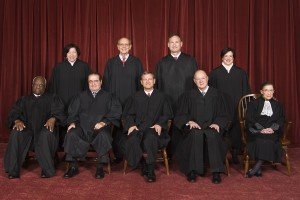
By Jason Hines, PhD –
[dc]T[/dc]his past Friday was Religious Freedom Day. So it was notable that on the same day the Supreme Court decided to hear cases that will determine whether same-sex marriage will be constitutional nationwide.[1] Predictably, there has been some hand-wringing from some conservative Evangelicals, cautiously optimistic about having a Supreme Court ruling, but also adamant about?their beliefs in “traditional” marriage and some even vowing some form of disengagement from the larger society if the Court should rule against their wishes. LGBT advocates are much more hopeful, mostly based on a ruling in their favor in the Windsor case that went before the Court last year.
The Court will consider two questions when the case is argued – First, “does the Fourteenth Amendment require a state to license a marriage between two people of the same sex?” ?Second, “does the Fourteenth Amendment require a state to recognize a marriage between two people of the same sex when their marriage was lawfully licensed and performed out-of-state?”
These questions create three possible outcomes. One, the Court could decide yes on both questions. If they rule this way the same-sex marriage will become the unencumbered law of the land.?The second option the Court could choose is to answer no on both questions. Choosing this option would result in several states reinstating same-sex marriage bans, despite the fact that circuit courts overruled those bans over the last few years. Same-sex couples could only be married in states that affirmatively decided on gay marriage, and they could not enjoy those benefits if they moved to a state that did not have same-sex benefits. Finally, the Court could say no to the first question but yes to the second. Under this system, same-sex couples could get married in New York, move to Texas and have their marriage respected by Texas, despite the fact that same-sex marriage is banned in Texas.
While there are plausible arguments to the contrary, I think that the Court will most likely rule in favor of same-sex marriage. The rationale of the Windsor decision is equally applicable in these cases, and it seems contrary to the operations of the Court to allow same-sex marriage to occur for this long only to overturn it when another case comes before it.
The issue of same-sex marriage is uniquely situated as a church-state, religious liberty issue. I’ve dealt with the?issue several times on HineSight. This was the first issue I took up after the series of posts that started the blog itself. As always I think it is important to note that the type of marriage we are talking about extending to same-sex couples is the secular form of marriage and that no church will be required to perform same-sex marriage ceremonies.
But there is an even more important connection to religious liberty that is important to note here. If you believe in the freedom of conscience that undergirds religious liberty, you cannot just believe in it for those who believe the same faith as you, or even for those who have a faith. Religious liberty has to be just as concerned with the ability of those who have no faith to live their lives with as much freedom as possible. Allowing same-sex marriage does not diminish the freedom of anyone else, and any problems it does create are the types of problems we should be eager to solve for everyone’s benefit. Furthermore, with so much variance between even Christian beliefs, I am shocked at how concerned with are with one more difference. Even so, “if possible, so far as it depends on you, be at peace with all men.” (Rom 12:18) We may disagree with the way people decide to live. That is the Christian’s lot in a sinful world.
God has not called us to keep people’s decisions from them. Instead, we are told that freedom exists where the Spirit of the Lord is, and that freedom is for everyone.
###
